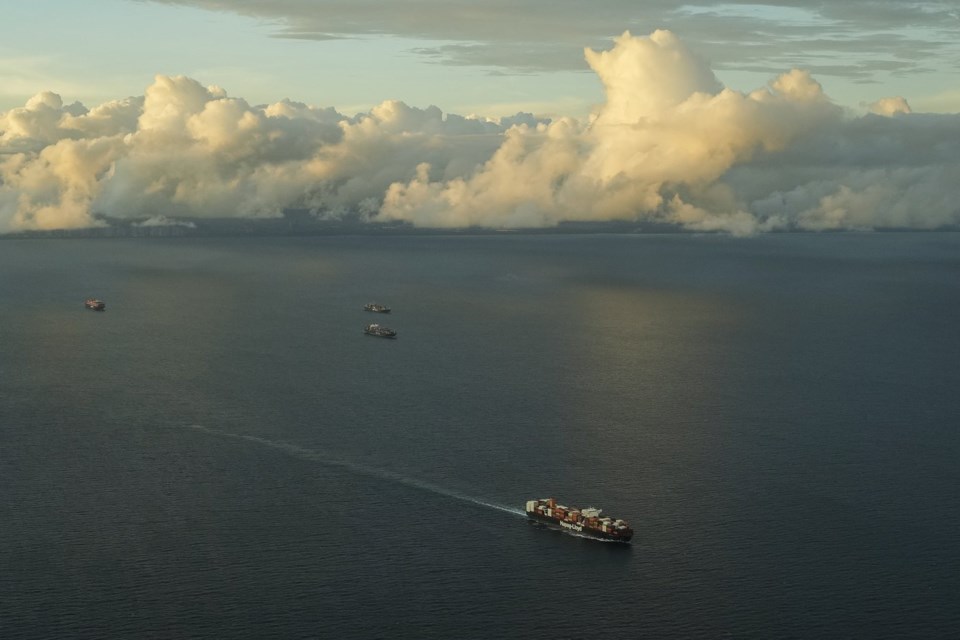HAMBURG, Germany (AP) — For years, the international shipping industry has been criticized for making little progress in reducing the carbon-belching pollution released from the fuels that vessels use in moving most of the cargo that people use every day, such as food, cars and clothing.
Now, the new head of the International Martime Organization, charged with regulating international shipping, is subtly calling out inaction and nudging companies to work harder. “What I’m finding is that there is more that can be done,” said Arsenio Dominguez, who gave a wide-ranging interview on the sidelines of the Hamburg Sustainability Conference in Germany this week. “The low hanging fruit is there.”
Dominguez, who took over as secretary general at the beginning of this year, said that includes using satellites to chart routes according to weather, to waste less fuel, cleaning the hulls of ships to reduce friction in the water and what is often referred to as slow steaming, reducing ship speed, which also uses less fuel and thus pollutes less.
Dominguez was careful to note that many companies are working to cut greenhouse gas emissions, which cause climate change. But getting to the IMO's goal of a 30% reduction in emissions by 2030 will require immediate implementation of every possibility.
A focus on the fuels that power ships
Ultimately, major decarbonizing will mean an overhaul of shipping fuel, said Dominguez, a point industry leaders agree on.
Today, most ships run on heavy fuel oil, which releases carbon dioxide along with sulfur, nitrogen and other pollutants. Much cleaner fuels already exist, and many more are being developed, such as hydrogen, and biofuels. But they are more expensive, not yet available at scale and only better for the planet when made in clean ways. For example, hydrogen can be made from water and clean energy via a process called electrolysis, and that does not release greenhouse gases. It's considered “green” hydrogen. However, nearly all hydrogen today is made out of methane, meaning natural gas, using steam-methane reforming, which releases carbon dioxide.
“Fuels, fuels, fuels,” Bud Darr, executive vice president for maritime policy and government affairs for MSC Mediterranean Shipping Company, said when asked during a panel at the sustainability conference on Monday what the biggest challenges were to decarbonizing.
“We need a massive scaling up of both production and shoreside infrastructure in order to deliver what we will need to operate the new generation of ships and equipment that we are investing in,” Darr said in a followup email.
Currently, the shipping industry is responsible for about 3% of global greenhouse gas emissions. Their total emissions are expected to go up sharply in future decades unless major changes are made.
Other parts of the world economy have made strides in decarbonizing, including electricity and ground transportation, thanks to electrification. Comparatively little has happened in shipping.
“The IMO has been very slow,” said Bastien Bonnet-Cantalloube, an expert on shipping and aviation decarbonization with non-profit Carbon Market Watch. “There was no progress in 10 or 15 years. Now things are starting to pick up.”
Last year, the IMO set a target to , a goal that is a potential catalyst while also putting a spotlight on just how far the industry has to go.
The IMO is being pushed to move toward a carbon tax in part to be in line with what is already happening in some places, like the European Union.
Starting this year, large ships coming in and out of European ports pay taxes on their carbon dioxide emissions. In 2026, they will also pay for emissions of the greenhouse gases methane and nitrous oxide. Some industry leaders hope that a carbon levy from the IMO, which would effectively be the world’s first global carbon tax, could allow shipping companies to simply pay one carbon tax, instead of taxes in multiple jurisdictions.
Still, there is wide disagreement, both among countries and shipping companies over a tax, how much it should be and what revenue would be used for.
IMO moving toward potentially big decisions next year
During meetings earlier this month in London, the IMO’s Marine Environment Protection Committee continued drafting text on mandates to phase in cleaner fuels and set a greenhouse gas pricing mechanism. But what those principles will translate into is far from clear.
“I don’t call it a tax. I know that is a way of referring to it," said Dominguez, underscoring the sensitivity of the issue.
Dominguez said delegates, member countries of the IMO, considered multiple scenarios for rating the carbon efficiency of ships, setting fuel standards and gathering revenue for emissions.
The committee next meets in April, when it’s expected to approve the measures. Formal adoption would take place in the fall, and whatever is decided wouldn’t take effect until 2027, giving countries and companies time to adjust.
In the meantime, Dominguez said that shipping companies needed to do all they could to cut emissions, which for some included using liquid natural gas as a fuel.
Ship engine manufacturers had shown that using LNG in engines increased efficiency, which led to lower emissions, he said.
“If we stop LNG right now without an alternative, then we go back to Square 1,” he said, adding that he knew it “was a divisive point.”
Indeed, scientific studies have shown that leaks of LNG, which is mostly methane, itself a potent greenhouse gas, can cancel out any advantage gained from burning more cleanly compared to other fossil fuels. Environmentalists have long argued that using LNG is simply a way for major oil and gas producers to continue business as usual, thus postphoning a major transition to renewable energies.
___
The Associated Press’ climate and environmental coverage receives financial support from multiple private foundations. AP is solely responsible for all content. Find AP’s for working with philanthropies, a list of supporters and funded coverage areas at .
Peter Prengaman, The Associated Press




